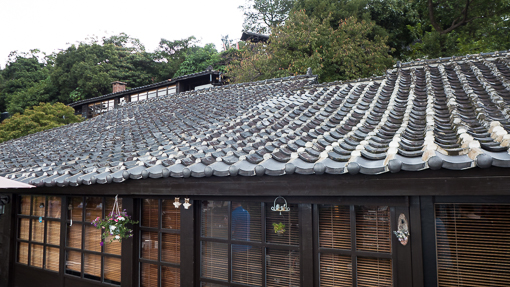This is the second post on our visit to the former residence of Marshal Zhang 少帥禪園 located just outside of Taipei. Click here to read the first part.
We booked a table for lunch at the restaurant which offered a very limited tasting menu.

The restaurant is in what seems to be the main building of classical Japanese design with windows intricately latticed.

It was a weekday; there were only four or five occupied tables at lunch. The interior is not luxurious but somewhat modern and Japanese, with a display of a small fountain, hanging plants and what seemed like potted giant bonsai trees.

The whimsical decorations continue …

The soft and comfortable details seem ironic since this is one of the places of house arrest for Marshal Zhang which lasted nearly 40 years, although he was treated well. He gained his freedom in 1975 when he was in his 70’s.
 Zhang Xueliang 張學良 was the effective ruler of Northeast China and much of northern China after the assassination of his father, Zhang Zuolin 張作霖 (the “Old Marshal”), by the Japanese on 4 June 1928. His father as a warlord was in 1920 the supreme ruler of Manchuria.
Zhang Xueliang 張學良 was the effective ruler of Northeast China and much of northern China after the assassination of his father, Zhang Zuolin 張作霖 (the “Old Marshal”), by the Japanese on 4 June 1928. His father as a warlord was in 1920 the supreme ruler of Manchuria.

In the 1930’s, the leader of the Republic of China at the time, Chiang Kai-shek, focused on fighting the communists within China rather than the threat of the Japanese.

He was detained in Xi’an in 1936 by Zhang Xueliang and another general in order to force the ruling Chinese Nationalist Party (Kuomintang or KMT) to change its policies regarding the Empire of Japan and the Communist Party of China. This detention precipitated a political crisis, known as the Xi’an Incident 西安事變.

The crisis ended after two weeks of negotiation, in which Chiang was eventually released and returned to Nanjing, accompanied by Zhang. Chiang agreed to end the ongoing civil war against the communists and began actively preparing for the impending war with Japan.

Once Chiang were away from Zhang’s loyal troops, Chiang had him put under house arrest near the Nationalist capital, wherever it moved to. In 1949 Zhang was transferred to Taiwan.

There is a picture of Zhang and Chiang’s son at the residence.

After Chiang’s death in 1975, he gained some freedom but it was not restored officially until 1990. He immigrated to Honolulu, Hawaii, in 1993 and died of pneumonia in 2001 at the age of 100 there.

The food at the restaurant was very good. See our next post.

